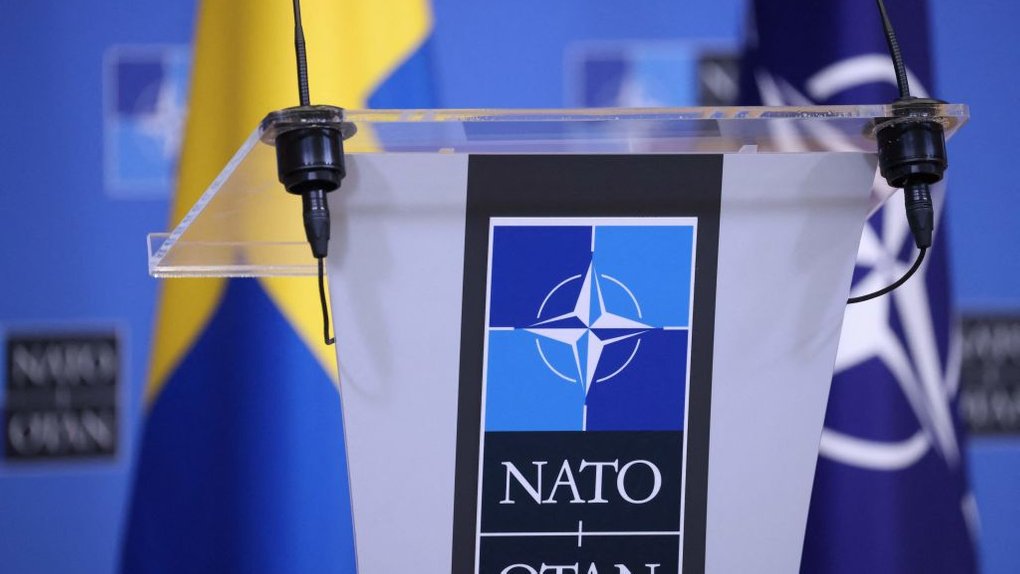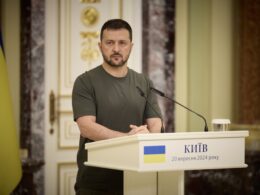President Volodymyr Zelenskyy of Ukraine — along with some Central European nations — had fervently hoped his country would be offered membership negotiations by NATO at the summit, which runs from 9 to 11 July.
However, as reported by The New York Times, NATO will not offer membership negotiations at its upcoming 75th anniversary summit in Washington. Instead, the alliance will offer Ukraine a new headquarters to manage its military assistance, officials said to the news outlet.
Called the NATO Security Assistance and Training for Ukraine, or NSATU, this new structure is supposed to increase the coordination of all kinds of aid to Ukraine over the longer term, American and NATO officials said. The move is intended to send a strong signal of allied commitment, both to Kyiv and to Moscow, which hopes the West will grow tired of supporting the war.
Because the mission will be under NATO’s auspices, it is designed to function even if Donald Trump, a sharp critic of the alliance and of aid to Ukraine, wins the US presidency in November.
The Biden administration and NATO officials came up with the idea as a way to give something solid to Kyiv at the summit even as they maintain the time is not right for Ukraine to join.
''It is not just that the country is still at war, which could make NATO an active participant in the fighting. President Biden and Chancellor Olaf Scholz of Germany have said that Ukraine must make important reforms to reduce corruption and improve its democracy and rule of law,'' the publication notes.
The hope is that the mission and the commitment it represents will satisfy Zelenskyy and lead to a smoother summit than the last one, a year ago in Vilnius, Lithuania, where he made his unhappiness clear when Ukraine was not offered
a firm timeline for membership negotiations.
NATO Security Assistance and Training for Ukraine
The new mission will bring under one umbrella the activities of the current “capabilities coalition” of countries that provide various aspects of military aid to Ukraine, like air defenses, artillery, F-16 fighter jets, arms and training.
It will also coordinate training of Ukrainian military personnel in allied countries and the longer-term bilateral security agreements that different countries have signed with Ukraine, according to the United States and NATO officials, who spoke on the condition of anonymity because details of the plan have not yet been announced.
Previously, aid for Ukraine has been given mostly on a country-by-country basis, with less concern over its efficiency or even for Kyiv’s most pressing needs. Gathering the essential strands of aid and training under one command is aimed at streamlining the flow and making it more coherent, officials briefed on the plan said.
The mission will work to reduce duplications and complications from the various kinds of weaponry sent to Ukraine.
''Trump-proofing'' aid to Ukraine
The mission will be based at a US military facility in Wiesbaden, Germany, and headed by a three-star general — likely an American — reporting directly to the top NATO and American general in Europe, General Christopher Cavoli.
''Placing the mission under General Cavoli’s NATO hat will protect it from any political change in Washington,'' said Ivo Daalder, a former American ambassador to NATO who has been briefed on the plan.
In addition, it will run parallel to the Ukraine Defense Contact Group, which is under American leadership and coordinates weapons deliveries by about 50 countries to Ukraine, well beyond NATO’s own 32 member states.
The group will not officially be called a “mission” because of objections from Germany, which wanted to avoid the implication that it and NATO were at war with Russia, Mr. Daalder said, even though Russia already spins its invasion of Ukraine as a war of “self-defense” against an ever-expanding and hostile NATO.
“It’s an effort at Trump-proofing and a deliberate effort to bring Ukraine and NATO closer together to support Ukraine today as well as into the future,” Daalder said.
The Biden administration has not commented publicly on the details of the plan. But Jake Sullivan, the US national security adviser, said that the summit would show that allies are taking “concrete steps”
to bring Ukraine closer and to ensure it has a “bridge to eventual membership.”
Read more:
- White House reaffirms belief in Ukraine’s NATO future, first expects war win
- Trump says Biden should not have promised Ukraine NATO membership
- NATO members debating what commitment to give on Ukraine joining alliance at upcoming summit
- Appointment of Rutte as NATO Secretary General signals continued support for Ukraine
- Framework for Ukraine’s security guarantees: main points of G7’s declaration
- NATO to strengthen ties in Asia-Pacific amid Putin’s visit to North Korea





